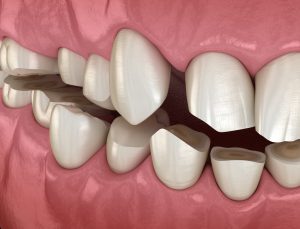 It goes without saying that loving the smile you sport holds significant meaning for a lot of people. After all, many patients say that a brighter grin is indicative of a heightened sense of self-confidence, and everyone should be pleased with their smile. Still, however, there are countless threats out there that impact this goal. As a matter of fact, there are more than can be counted on two hands, and falling short in your preventive routine can significantly increase your chances of developing one. In today’s blog, your Cedar Rapids, IA dentist will take a look at a not-so-traditional source of dental complications known as bruxism, and how our team can provide treatment to help.
It goes without saying that loving the smile you sport holds significant meaning for a lot of people. After all, many patients say that a brighter grin is indicative of a heightened sense of self-confidence, and everyone should be pleased with their smile. Still, however, there are countless threats out there that impact this goal. As a matter of fact, there are more than can be counted on two hands, and falling short in your preventive routine can significantly increase your chances of developing one. In today’s blog, your Cedar Rapids, IA dentist will take a look at a not-so-traditional source of dental complications known as bruxism, and how our team can provide treatment to help.
How Does it Develop?
Bruxism is the name given to chronic teeth-grinding. Indeed, this is a process that occurs when a person clenches their upper and lower sets of teeth together and proceeds to move the lower jaw from side to side. What’s more? It can occur whether a person is conscious or unconscious, and is brought on by a number of possibilities. These include environmental stress, internal stress, and more.
When a person develops chronic teeth-grinding, he or she may be able to tell by a few basic signs or symptoms. Immediate effects might include a sore or tense jaw, difficulty biting, chewing, or even opening the mouth all of the way, and more.
While bruxism can occur at any time and affect anyone, it is important to recognize that you must seek treatment before your condition becomes worse. To learn more about this process and how our team might help, give our office a call today.
The Impact on Your Health
Some of the common issues that arise with bruxism include damage to your teeth. You see, as the structures generate friction from tightly clenching and rubbing together, you end up wearing down the protective layer of dental enamel that surrounds each tooth. This ends up exposing your structures to more damage such as tooth decay, infection, and more.
Additionally, the constant friction generated by chronic grinding causes your teeth to become more brittle as well, increasing your chances of developing noticeable chips and cracks. Reach out to our team today to learn more about this process and what steps you can take.
Why You Need Treatment
Without proper treatment, your chronic teeth-grinding can develop into an even more serious concern such as TMJ disorder. This phenomenon occurs when your lower mandible becomes misaligned with one or both of the temporomandibular joints (TMJs) at which the jaw hinges to the cranium. Fortunately, TMJ treatment and bruxism treatment are available.
Schedule Your Appointment
Contact Cedar Dental in Cedar Rapids, IA by calling 319-364-7108 to learn more about the dangers of chronic teeth-grinding, and schedule your next appointment with our team today.




Recent Comments